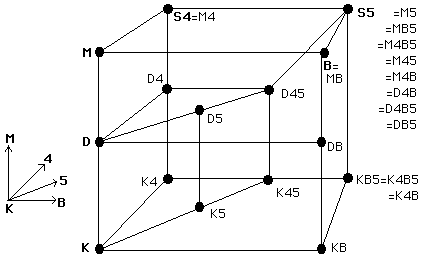I'm thinking of doing something or other with this objection, so if anyone has anything to add please do!
as always:
<> is the possibility daimond
[] is the necessity box
A is the universal quantifier
E is the existential quantifier
Let (ST) be a second order predicate that has all and only spatiotemporal relations in its extension. Given that there are multiple spatiotemporal relations, a natural definition of worldmateism is as follows:
defn': Two things x and y are worldmates iff ER((ST)R&xRy)
Too avoid sticky issues, lets assume all worlds discussed are chaotic (no causal relations involved). This isn't cheating since causal relations aren't necessary for spatiotemporal relations.
The complaint is that Lewis now owes us some necessary and sufficient conditions for being a spatiotemporal relation. I'll argue that he can't, in principle give one.
Consider two relations that must count as spatiotemporal relations: being spacially related, and being temporally related. These can be conceptually divided. Moreso, being related to something in a world by either means is sufficient for being in that world. For isntance, if there's two spacially isolated worlds, but each moment in time in one is the very same moment in time in the other, they would be one world on Lewis's view. Indeed, he gives these kind of compromises when he argues that the impossibility of island universes is not so bad.
So if we propose any necessary conditions for being a spatiotemporal relation, both space and time must have them. Maybe some philosophers of time will help sort this out. What I will argue is that all the features that space and time have in common do not jointly make sufficient conditions for being a spatiotemporal relation. If the sum of all necessary conditions do not make for sufficient conditions, there is not set of necessary&sufficient conditions. If a condition is added so the the set is sufficient for being spatiotemporal, the resulting set would not be necessary since either space or time (or both) does not have that condition. Thus, necessary and sufficient conditions can not be given, and Lewis's fallback definition of worldmate gainst the status of "bogus".
So, space and time are conceptually different. One may say qualitatively different. By this I mean there's no basic unexpressable quality they have in common (there's no way to describe time to a timeless person in terms of space, or space to an intelligent volumeless spirit in terms of time). Barring that, there are a few similarities that may be candidates for necessary conditions of spatiotemporallness.
note: when "R" contains no ' after it, it denotes a general relation "sharing a space" if you will. R', R'' denote specific relations within the general one ex. "being 3 feet to the left of", "being 5 seconds after".
1) conditional reflexivity: Ax(Ey(xRy)->xRx)
2) symetry: AxAy(xRy->yRx)
3) transitivity: AxAyAz((xRy&yRz)->xRz)
4) occupancy: Ax(Ey(xR'y&xR''y&xR'''y...)->Az((~z=x)->~(zR'y&zR''y...)))
5) absolutism: AR'ExEy(xR'y)
6) capacity: Ax(Ey(xRy)->Px)
I assume the first 3 are self explanitory. Occupancy simply states that if one "point" in the "world" is properly situated, no other point can share that space. That is to say, if a world has n many spatiotemporal relation, and x bears a specific relation to y with respect to each of them, no z may bear the exact same relations to y. Absolutism would state that for any specific spatiotemporal relation (ex. being 3 cm to the left of), you'll find a couple points that meet it. Capacity requires some explanation. I'll define Px as "x can be assigned a value". I mean this only to say some points can be considered "occupied" while others can be considered "unoccupied". I wanted to leave it open whether a point could be more or less occupied on a scale. I figure, those are the important similarities between space&time (although there are more I'm sure). Which of those merit being necessary conditions for being a spatiotemporal relation? Well, for arguments sake let's suppose all of them are (that will only make my conclusion stronger). Now I simply need to ask, is there any relations that satisfies these which is not a spatiotemporal relation? Of course there is! There's lots! Consider the relation (xRy iff x and y both hold world records). Say x holds a world record if for some value, x holds more of that value than anything else. The universe would probably get the world record for biggest individual, perhaps Carl Friedrich Gauss would hold the world record for greatest mathematical ability. To produce the sub-relations R', R'' etc. you could just arrange an arbitrary ordering of the world record holders, and xR'y iff y succeeds x in the ordering.
So, finaly, I can set up an argument:
1) Space and time must both meet all necessary conditions for being a spatiotemporal relation
2) If (1) then (3)
3) If there are necessary&sufficient conditions for being a spatiotemporal relation, space and time must have them as well
4) ~(space and time jointly have sufficient conditions for being a spatiotemporal relation)
5) if (4) then (6)
6) ~(consequent of 3)
7) ~(there are necessary & sufficient conditions for being a spatiotemporal relation)
if (7) is right, Lewis can't say much about what constitutes a world aside from "gather the stuff I want to be worldmates together, and call that a world". We need more than that!!!
8) if(7) then (9)
9) ~(there are necessary&sufficient conditions for two things being worldmates)
it's 4:30 AM, so I'll add some sarcasm here
10) if (9) then (11)
11) only magic can bind worldmates together! (that's kind of a sweet thought)
I wanted to argue that Lewis get the wrong result as far as saying what's a world-mate of what, but I've argued that he doesn't get any result. Well, I'll stop here. Please comment, especially time folks.
Tuesday, July 31, 2007
Subscribe to:
Post Comments (Atom)

No comments:
Post a Comment